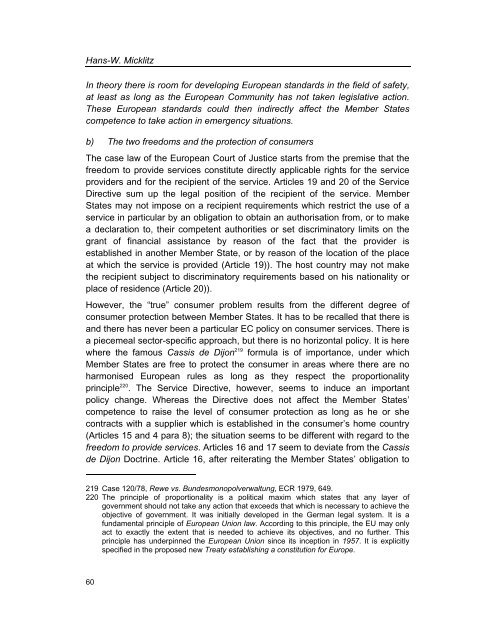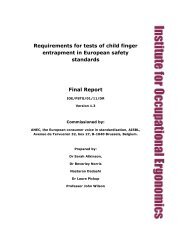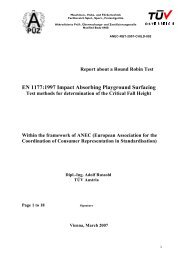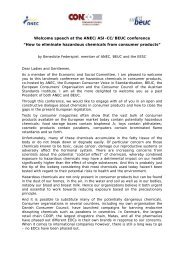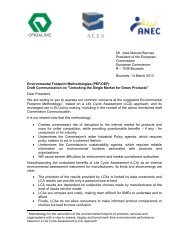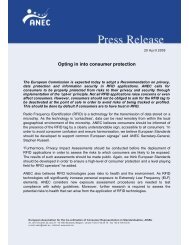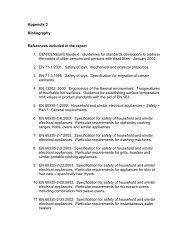Services Standards: Defining the Core Consumer Elements ... - ANEC
Services Standards: Defining the Core Consumer Elements ... - ANEC
Services Standards: Defining the Core Consumer Elements ... - ANEC
You also want an ePaper? Increase the reach of your titles
YUMPU automatically turns print PDFs into web optimized ePapers that Google loves.
Hans-W. Micklitz<br />
In <strong>the</strong>ory <strong>the</strong>re is room for developing European standards in <strong>the</strong> field of safety,<br />
at least as long as <strong>the</strong> European Community has not taken legislative action.<br />
These European standards could <strong>the</strong>n indirectly affect <strong>the</strong> Member States<br />
competence to take action in emergency situations.<br />
b) The two freedoms and <strong>the</strong> protection of consumers<br />
The case law of <strong>the</strong> European Court of Justice starts from <strong>the</strong> premise that <strong>the</strong><br />
freedom to provide services constitute directly applicable rights for <strong>the</strong> service<br />
providers and for <strong>the</strong> recipient of <strong>the</strong> service. Articles 19 and 20 of <strong>the</strong> Service<br />
Directive sum up <strong>the</strong> legal position of <strong>the</strong> recipient of <strong>the</strong> service. Member<br />
States may not impose on a recipient requirements which restrict <strong>the</strong> use of a<br />
service in particular by an obligation to obtain an authorisation from, or to make<br />
a declaration to, <strong>the</strong>ir competent authorities or set discriminatory limits on <strong>the</strong><br />
grant of financial assistance by reason of <strong>the</strong> fact that <strong>the</strong> provider is<br />
established in ano<strong>the</strong>r Member State, or by reason of <strong>the</strong> location of <strong>the</strong> place<br />
at which <strong>the</strong> service is provided (Article 19)). The host country may not make<br />
<strong>the</strong> recipient subject to discriminatory requirements based on his nationality or<br />
place of residence (Article 20)).<br />
However, <strong>the</strong> “true” consumer problem results from <strong>the</strong> different degree of<br />
consumer protection between Member States. It has to be recalled that <strong>the</strong>re is<br />
and <strong>the</strong>re has never been a particular EC policy on consumer services. There is<br />
a piecemeal sector-specific approach, but <strong>the</strong>re is no horizontal policy. It is here<br />
where <strong>the</strong> famous Cassis de Dijon 219 formula is of importance, under which<br />
Member States are free to protect <strong>the</strong> consumer in areas where <strong>the</strong>re are no<br />
harmonised European rules as long as <strong>the</strong>y respect <strong>the</strong> proportionality<br />
principle 220 . The Service Directive, however, seems to induce an important<br />
policy change. Whereas <strong>the</strong> Directive does not affect <strong>the</strong> Member States’<br />
competence to raise <strong>the</strong> level of consumer protection as long as he or she<br />
contracts with a supplier which is established in <strong>the</strong> consumer’s home country<br />
(Articles 15 and 4 para 8); <strong>the</strong> situation seems to be different with regard to <strong>the</strong><br />
freedom to provide services. Articles 16 and 17 seem to deviate from <strong>the</strong> Cassis<br />
de Dijon Doctrine. Article 16, after reiterating <strong>the</strong> Member States’ obligation to<br />
219 Case 120/78, Rewe vs. Bundesmonopolverwaltung, ECR 1979, 649.<br />
220 The principle of proportionality is a political maxim which states that any layer of<br />
government should not take any action that exceeds that which is necessary to achieve <strong>the</strong><br />
objective of government. It was initially developed in <strong>the</strong> German legal system. It is a<br />
fundamental principle of European Union law. According to this principle, <strong>the</strong> EU may only<br />
act to exactly <strong>the</strong> extent that is needed to achieve its objectives, and no fur<strong>the</strong>r. This<br />
principle has underpinned <strong>the</strong> European Union since its inception in 1957. It is explicitly<br />
specified in <strong>the</strong> proposed new Treaty establishing a constitution for Europe.<br />
60


